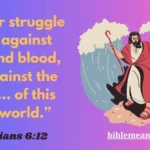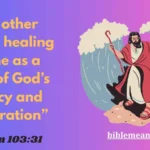When we think of wrath, especially in the biblical context, it’s easy to imagine anger and judgment.
After all, the Bible speaks about God’s wrath, and this concept often carries a tone of fear and distress.
However, as Christians, it’s important to understand that God’s wrath is not just an emotion but a divine response to sin and injustice.
Wrath in the Bible is complex, yet deeply connected to God’s holiness, justice, and love for His creation.
Many believers may feel uncertain or troubled by the idea of wrath.
They may wonder: Is God’s wrath something I should fear? How does this concept fit into the overall message of love and grace found in Scripture? Understanding the spiritual significance of wrath from a biblical perspective can lead to a deeper, more peaceful relationship with God.
This article aims to explore this topic, bringing clarity and comfort through biblical wisdom.
Biblical Background
In the Bible, wrath is not an emotion driven by frustration or a loss of control, but rather it is a deliberate, righteous response of God to sin, injustice, and evil. In the Old Testament, God’s wrath is often associated with judgment against nations or individuals who persist in rebellion against His commands. The New Testament shifts the focus to God’s wrath in relation to the salvation offered through Jesus Christ.
God’s Wrath in the Old Testament:
- Genesis 18:20-21 tells us that God’s wrath was stirred by the sins of Sodom and Gomorrah, leading to their eventual destruction. The Lord, however, gave ample warning before delivering judgment.
- Exodus 32:9-10 speaks of God’s anger when Israel turned to idolatry with the golden calf. His wrath was aroused, but Moses interceded, and God’s mercy spared them.
God’s Wrath in the New Testament:
- Romans 1:18 says, “The wrath of God is revealed from heaven against all ungodliness and unrighteousness of men.” In this verse, the Apostle Paul explains that God’s wrath is not arbitrary but is revealed as a response to human sin.
- John 3:36 further clarifies that those who reject Christ are under God’s wrath, indicating that the ultimate judgment is linked to the rejection of Jesus as the Savior.
Spiritual Interpretations
- Wrath as Divine Justice
- Bible Verse: Romans 12:19 – “Do not take revenge, my dear friends, but leave room for God’s wrath, for it is written: ‘It is mine to avenge; I will repay,’ says the Lord.”
- Reflection: God’s wrath is closely tied to His justice. It’s a divine response to sin and evil, ensuring that wrongdoers are held accountable. As Christians, we are encouraged not to seek personal revenge, but to trust in God’s perfect justice. This serves as a reminder that God sees all, and His judgment is always fair and righteous.
- Wrath as an Expression of God’s Holiness
- Bible Verse: Psalm 7:11 – “God is a righteous judge, a God who displays his wrath every day.”
- Reflection: God’s holiness demands that He respond to sin. Wrath is not arbitrary but an essential aspect of God’s nature. He cannot overlook sin because it contradicts His perfect nature. As believers, understanding this helps us appreciate His purity and desire for us to live according to His will.
- Wrath as a Warning and Call to Repentance
- Bible Verse: Joel 2:12-13 – “Even now, declares the Lord, return to me with all your heart, with fasting and weeping and mourning. Rend your heart and not your garments. Return to the Lord your God, for he is gracious and compassionate, slow to anger and abounding in love.”
- Reflection: God’s wrath is often a warning, a call to repentance. It’s not about punishment for the sake of punishment, but an invitation for the sinner to turn from their ways and be restored to God. This is the great mercy of God, who desires to redeem rather than destroy.
- Wrath as Part of the Gospel
- Bible Verse: Romans 5:9 – “Since we have now been justified by his blood, how much more shall we be saved from God’s wrath through him!”
- Reflection: The wrath of God is not something we need to fear if we are in Christ. Through Jesus, we are spared from God’s judgment because He took the wrath we deserved upon Himself. This highlights the depth of God’s love, offering us salvation through the sacrifice of His Son.
Examples or Variations
In exploring the theme of wrath, we find that the context and actions surrounding it can shift its meaning. For instance, the Bible mentions instances where wrath can be directed at individuals, but also at entire nations or groups due to collective sin.
Wrath on Nations:
- Jeremiah 25:15-16 speaks of God’s wrath against nations that have rejected Him. The Lord warns that they will drink from the cup of His wrath, a symbol of divine judgment.
Wrath as Discipline for Believers:
- Hebrews 12:6 reminds us that God disciplines those He loves, and His correction may sometimes feel like wrath, but it is meant for our growth and refinement. God’s wrath, in this sense, is not about destruction but about bringing us back into alignment with His will.
Dealing with Negative Signs or Troubling Dreams
Sometimes, we may experience troubling dreams or unsettling thoughts that seem to indicate God’s wrath. If this happens, it’s essential to seek spiritual guidance, understanding, and peace. Troubling dreams or situations related to wrath may be an invitation to examine our lives and hearts, ensuring that we are living in alignment with God’s will.
Protective Prayers:
- Psalm 91:1-2 – “Whoever dwells in the shelter of the Most High will rest in the shadow of the Almighty. I will say of the Lord, ‘He is my refuge and my fortress, my God, in whom I trust.’”
- Ephesians 6:10-18 – The Armor of God is a powerful prayer for protection. We are encouraged to put on the full armor of God to stand against any spiritual attacks or negative influences.
Repentance and Reflection: If we feel God’s wrath is directed at us through troubling dreams or situations, it’s important to examine our hearts, confess any sin, and seek God’s mercy. Pray for peace and clarity in understanding any message He may be communicating through these experiences.
Faith Based Guidance
- Prayer for Protection:
- Prayer: “Lord, protect me from evil and cleanse my mind from any harmful thoughts or dreams. Help me to walk in Your peace and trust in Your love.”
- Self-Examination and Repentance:
- Take time to reflect on areas of your life where sin may be present. Ask God to reveal any areas that need repentance and commit to turning away from anything that grieves the Holy Spirit.
- Seeking Spiritual Help:
- If you are troubled by signs of God’s wrath, speak to a trusted pastor or spiritual mentor. They can provide guidance and prayer to help you gain understanding and peace.
Conclusion:
Understanding wrath in the Bible helps us appreciate the full spectrum of God’s character—His holiness, justice, and love.
Wrath is not something to fear but rather an opportunity for repentance and redemption.
As believers, we can rest in the knowledge that God’s wrath is not directed at us if we are in Christ, but instead, we are called to trust in His mercy and grace.
By seeking God’s protection, repenting where necessary, and immersing ourselves in Scripture, we can navigate the challenges of life with peace, knowing that God is both our righteous judge and our loving Savior.











